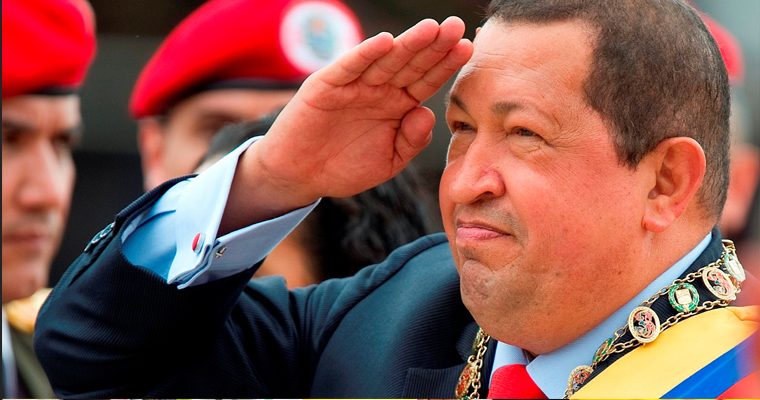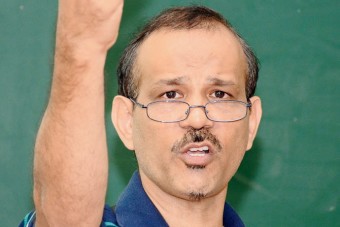Steven Gutkin, Chief Advisor to Goa Streets, covered Hugo Chavez’s 1992 coup attempt and subsequent rise to the presidency. Below is his take on the news of Chavez’s death from cancer after leading Venezuela for 14 years.
We were at a news conference in Beijing, and as part of the press corps travelling with Venezuelan President Hugo Chavez, I was allowed to ask a question. I wanted to make mine count, so I asked him about his opinion of the fact that while he rubbed shoulders with his Chinese counterparts, tens of thousands of men and women languished in the country’s prisons for the crime of expressing their beliefs. The question didn’t go over well, and our Chinese hosts singled me out by requiring me, when I finished the question, to publicly state my name – and then spell it.
“I did not come here to judge my Chinese brothers,” Chavez bellowed back. “I came here to embrace them!”
Back on his presidential jet, Chavez brought up my question again, telling me that he found it “interesting” and that he respected me for asking it.
Back in those days, this was typical of the duality of Hugo Chavez’s persona. He would clench his fists, raise his baritone voice and call his opponents “squealing pigs,” mesmerizing crowds while dressed in combat fatigues and railing against Venezuela’s “rancid oligarchs.”
Then the next day he’d suddenly appear in a business suit, attempting to woo investors and diplomats.
This second, more moderate persona appeared less and less after 2002, when Chavez survived a coup attempt promising national reconciliation but instead delivering retaliation. His death this week, 14 years after assuming Venezuela’s presidency, brings to an end one of Latin America’s – and the world’s – most fascinating political chapters.
He revolutionized politics, thumbed his nose at the world’s superpower, commandeered the resources of one of the world’s great oil powers, and realigned an entire continent.
Depending on your point of view, Chavez was either a disaster or a saviour. Dead at age 58 from an undisclosed form of cancer in his pelvic area, Chavez leaves behind an economy in shambles, media that have been silenced, a crime wave that has made Caracas one of the world’s most dangerous cities and a polarized society where hundreds of thousands of citizens feel unwanted. Yet buoyed by soaring oil prices, Chavez was able to make good on promises to reduce poverty and raise education and health care – which helps explain, along with his near superhuman charisma, why he remained wildly popular among the poor all these years.
It’s possible that Chavez’s deeply flawed socialism is superior to the crony capitalism it replaced. Perhaps the biggest tragedy of all, however, is that these have been the choices. A third way – such as the combination of leftist idealism and pragmatic economics that brought neighbouring Brazil out of its doldrums – possibly could have enabled Venezuela to prosper.
As it stands, the country has become a perfect example of “resource curse” – where vast oil wealth concentrates a nation’s economy around the state, inflates the exchange rate, creates few jobs and reduces the need for tax collection and thus accountability.
Chavez’s rise to the presidency in 1998 – six years after staging a bloody but unsuccessful coup attempt – was a stunning blow to the political and economic establishment that had ruled Venezuela during four decades of democracy.
I knew Hugo Chavez starting from the days of his first coup attempt. There were moments of humour, belligerence and reflection.
During that same trip to Asia, Chavez broke into a sprint while climbing the Great Wall of China, forcing journalists, bodyguards, businessmen and Chinese politicians to run along with him, including a Chinese minister in high heels who fell on her face trying to keep up.
I watched Chavez break protocol in Japan by not bowing to Emperor Akihito and instead giving him an exuberant bear hug (which the emperor graciously took in stride).
On a campaign stop before he became president, I watched veins protrude from his neck as he whipped a crowd into a frenzy with a particularly vitriolic speech against Venezuela’s “degenerate oligarchy.” Then I sat next to him at lunch moments later and he was suddenly quiet, almost morose, while he ate his rice and beans and responded to my questions with one and two-word answers.
Another time he scolded me in public for referring to Venezuelans as “miserable.” We always spoke in Spanish, and as a native English speaker to me the word meant “very unhappy.” It turns out I inadvertently provoked Chavez’s ire because in Spanish “miserable” means something more akin to “despicable.”
Most of the time, however, he was jovial in person – a far cry from the somewhat scary figure he could cut in public. My mother came up in one of our early conversations, and from then on, he never ceased to ask about her each time we met.
One time he granted me a private interview aboard his plane as a kind of birthday present. More interesting than the interview was getting an inside look at his private quarters on the presidential jet. It included a large bed, wide desk and luxurious furnishings. In later years, he travelled around in a posh Airbus A-319.
It was clear to me he relished the comforts that being president of a country with some of the largest oil reserves outside the Middle East affords – despite his constant pronouncements supporting the poor.
In the years I covered Chavez, his finest hour came not during his electrifying speeches from the palace balcony or his overhaul of every Venezuelan institution from Congress to the Supreme Court.
Instead, it came a year after his first election, when he personally oversaw relief efforts after massive landslides in the capital killed thousands of people. For the first and perhaps only time, Chavez stopped criticizing the “oligarchy” and instead praised private businesspeople for putting their money, helicopters, food and other resources at the service of the victims.
At that moment, there were hints of possibility of an inclusive Venezuela defined not by class warfare but social harmony. When he lived, that possibility was never realized. I hope it can happen now.
Steven worked as an international correspondent for more than two decades in Asia, the Middle East, the U.S. and South America, including a stint as bureau chief for the Associated Press in Caracas, Venezuela.




